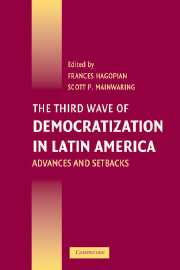Book contents
- Frontmatter
- Contents
- List of Figures
- List of Tables
- List of contributors
- Acknowledgments
- Introduction: The Third Wave of Democratization in Latin America
- 1 Latin American Democratization since 1978: Democratic Transitions, Breakdowns, and Erosions
- PART I THREE DEMOCRATIC GIANTS WITH AUTHORITARIAN PASTS: ARGENTINA, BRAZIL, AND MEXICO
- 2 Argentina: Democratic Survival amidst Economic Failure
- 3 The Growing Sustainability of Brazil's Low-Quality Democracy
- 4 The Demise of Mexico's One-Party Dominant Regime: Elite Choices and the Masses in the Establishment of Democracy
- PART II UNEXPECTED DEMOCRACIES IN UNLIKELY COUNTRIES: BOLIVIA, EL SALVADOR, AND GUATEMALA
- PART III DEMOCRATIC EROSIONS IN THE THIRD WAVE: COLOMBIA, PERU, AND VENEZUELA
- PART IV Conclusions
- References
- Index
2 - Argentina: Democratic Survival amidst Economic Failure
Published online by Cambridge University Press: 05 September 2012
- Frontmatter
- Contents
- List of Figures
- List of Tables
- List of contributors
- Acknowledgments
- Introduction: The Third Wave of Democratization in Latin America
- 1 Latin American Democratization since 1978: Democratic Transitions, Breakdowns, and Erosions
- PART I THREE DEMOCRATIC GIANTS WITH AUTHORITARIAN PASTS: ARGENTINA, BRAZIL, AND MEXICO
- 2 Argentina: Democratic Survival amidst Economic Failure
- 3 The Growing Sustainability of Brazil's Low-Quality Democracy
- 4 The Demise of Mexico's One-Party Dominant Regime: Elite Choices and the Masses in the Establishment of Democracy
- PART II UNEXPECTED DEMOCRACIES IN UNLIKELY COUNTRIES: BOLIVIA, EL SALVADOR, AND GUATEMALA
- PART III DEMOCRATIC EROSIONS IN THE THIRD WAVE: COLOMBIA, PERU, AND VENEZUELA
- PART IV Conclusions
- References
- Index
Summary
Latin American regimes followed diverging paths during the Third Wave of democratization. Although a few democracies consolidated (Chile, Uruguay), many others (Dominican Republic, Ecuador, Guatemala, Peru, Venezuela) suffered repeated and often severe institutional crises. Most accounts place Argentina's post-1983 democracy in this latter, “crisis-ridden” category. During the 1980s, the country suffered three military rebellions, severe distributive conflict, and an eventual descent into hyperinflation. Although the economy stabilized during the 1990s, the government of Carlos Menem concentrated and abused power to such a degree that Argentina was viewed as a leading case of what Guillermo O'Donnell (1994) called “delegative democracy.” Finally, the political–economic crisis of 2001–02, during which massive protests led to the resignation of two presidents within two weeks, again brought Argentina's democratic institutions to the brink of collapse.
Yet Argentine democracy differed in important ways from other crisis-ridden regimes in Latin America. First, Argentina was one of only a handful of Latin American countries that remained fully democratic during the 1990s. The fairness of elections was unquestioned, basic civil liberties were broadly protected, and unlike many other countries in the region (including Chile), the military played virtually no role in politics. Second, the country's core democratic institutions proved remarkably robust. Argentine democracy survived a series of extraordinary tests, including the 1989–90 hyperinflationary crisis, the Menem government's radical economic reforms, and, most recently, the most severe depression in the country's history. Few Latin American democracies have survived such economic shocks.
- Type
- Chapter
- Information
- The Third Wave of Democratization in Latin AmericaAdvances and Setbacks, pp. 63 - 89Publisher: Cambridge University PressPrint publication year: 2005
- 11
- Cited by

